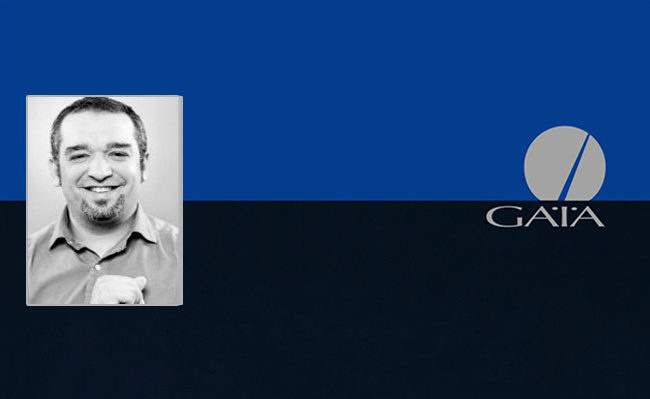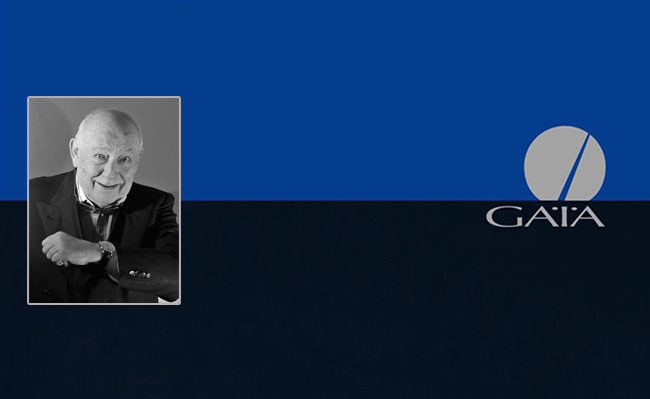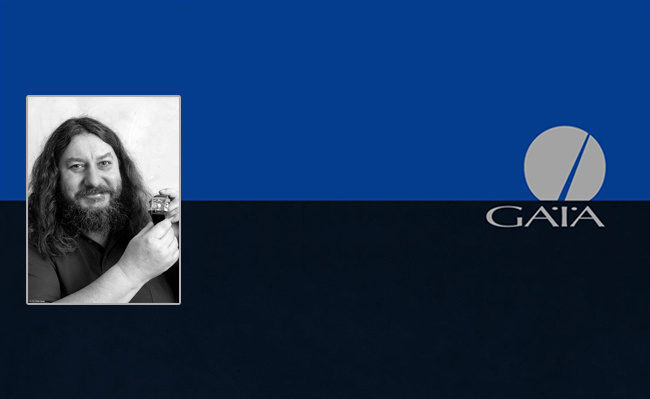

Prix Gaïa 2012 – Francesco Garufo. History-Research category
The Prix Gaïa jury was keen to recompense a researcher and historian having contributed a new approach to the watchmaking industry, primarily through the key players, the workers.
A historian with an unusual background, Francesco Garufo submitted a PhD thesis in June 2011, in co-supervision with the Institute of History at the University of Neuchâtel and the University of Technology of Belfort-Montbéliard (FR) entitled "The use of time, the Swiss watchmaking industry and immigration". The prize-winner displayed a novel historical approach to the watchmaking industry with his fundamental research into the important contribution of immigrants, primarily women, during the boom of the industry after the 1960s.
His career
Born to Italian-Spanish parents who had immigrated to Zurich, then Le Landeron , Francesco Garufo, to simplify matters, trained as a house painter in his father's company, a profession he continued to pursue while attending evening classes to obtain his federal school leaving diploma.
His eagerness to learn and his passion for history prompted him to complete his studies at the University of Neuchâtel, concluding his successful academic career with a PhD in 2011. During his studies, Francesco Garufo worked part-time as an editor between 2000 and 2006 on the Italian editorial team at Swiss txt.
He is currently a lecturer and research assistant with the Institute of History at the University of Neuchâtel. In 2011, Francesco Garufo, backed by almost a decade of experience in adult education, founded a company specialising in training courses in communication (Actaes Sàrl).
His work
The list is too long to name all his endeavours here, suffice it to say that he has participated in around fifteen symposia, organising several of them himself, always making a contribution closely linked with his specialised knowledge of the history of migration, unions and more generally the economic and industrial history of the Jura Arc region. His early career was accompanied by numerous articles published in collective, or other works. A non-exhaustive list of the afore-mentioned is enclosed herewith.
The Prix Gaïa goes to Francesco Garufo
The Prix Gaïa constitutes a major form of recognition for the winner and the work he has undertaken for several years on the history of watchmaking, with the support of employers' associations (notably the CP Employers' federation of the Swiss watch industry), labour unions (UNIA), watchmaking companies (Tissot SA) and numerous private individuals.
Publications
- Boillat Johann, Garufo Francesco, De la protection à la promotion: aux sources du Swiss made horloger (1924-1980), in Decorzant Yann, Heiniger Alix, Reubi Serge, Vernat Anne (dir.), Le Made in Switzerland : mythes, fonctions et réalités, Basel: Schwabe, 2012, p. 209-226.
- Garufo Francesco, L’emploi du temps : l’industrie horlogère suisse et l’immigration (1930-1980), PhD thesis, University of Neuchâtel- University of Technology of Belfort-Montbéliard, 2011.
- Garufo Francesco, De l’impact des mutations technologiques:
- interchangeabilité et composition de la main-d'œuvre horlogère, in Collectif, De l’unique à la série: l’interchangeabilité. Actes de colloque, La Chaux-de-Fonds: Editions Institut l’homme et le temps, 2011, p. 316-328.
- Garufo Francesco, La libéralisation de l’horlogerie ou les limites de la cartellisation (1951-1971), in Cortat Alain, Contribution à une histoire des cartels en Suisse, Neuchâtel: Alphil – Swiss University Press 2010, p. 165-184.
- Tissot Laurent, Garufo Francesco, Daumas Jean-Claude, Lamard Pierre (dir.), Histoires de territoires. Les territoires industriels en question, XVIIIe- XXe siècles, Neuchâtel: Alphil – Swiss University Press, 2010.
- Garufo Francesco, Les politiques de main-d'œuvre dans l’horlogerie de l’Arc jurassien suisse: entre immigration et décentralisation (1945-1975), in Tissot Laurent, Garufo Francesco, Daumas Jean-Claude, Lamard Pierre (dir.), Histoires de territoires. Les territoires industriels en question, XVIIIe-XXe siècles, Neuchâtel: Alphil – Swiss University Press, 2010, p. 169-191.
- Garufo Francesco, Travail frontalier et segmentation du marché de l’emploi horloger: le cas de Tissot SA (1960-1980), Géo-Regards 2 (2009), p. 23-37.
- Garufo Francesco, Horlogerie et travailleurs étrangers: la libéralisation du marché de l’emploi face aux limitations cartellaires et publiques, in Donzé Pierre-Yves, Fior Michel, Transitions historiques et construction des marchés : mutations et contre-mutations dans l’économie suisse aux XIXe et XXe siècles, Neuchâtel: Alphil – Swiss University Press, 2009, p. 87-110.
- Garufo Francesco, Besson Roger, La Coupe du Monde 1954 et la prise en charge de ses spectateurs: le point de vue des organisateurs, in Bancel Nicolas, David Thomas, Ohl Fabien, Le football en Suisse : enjeux sociaux et symboliques d’un spectacle universel, Neuchâtel: CIES, p. 47- 67, 2009.
- Garufo Francesco, Abondances et disettes and La question sociale, in Tissot Laurent, Bujard Jacques, Le Pays de Neuchâtel et son patrimoine horloger, Chézard-Saint-Martin: Ed. de la Chatière, p. 247-255 and p. 271-280, 2008.
- Garufo Francesco, Les travailleurs frontaliers, in Collectif, Le Val-de- Travers: une région, une identité, Hauterive: éditions Gilles Attinger, p. 273-276, 2008.


